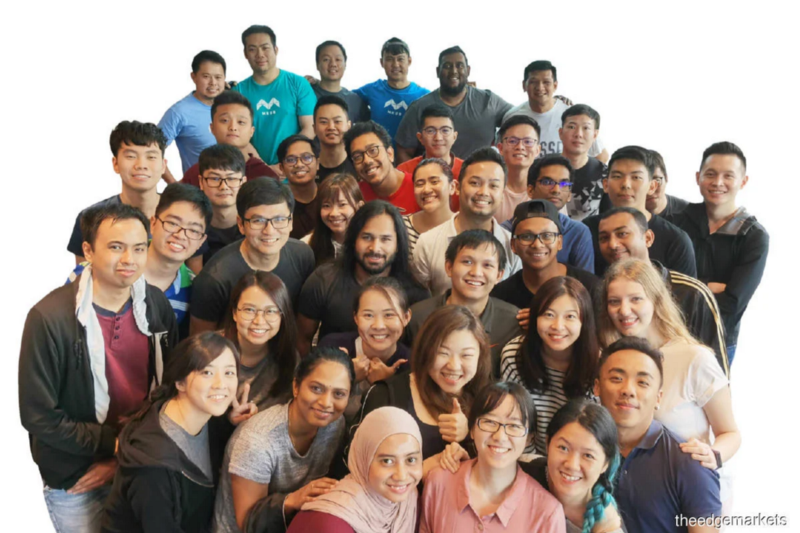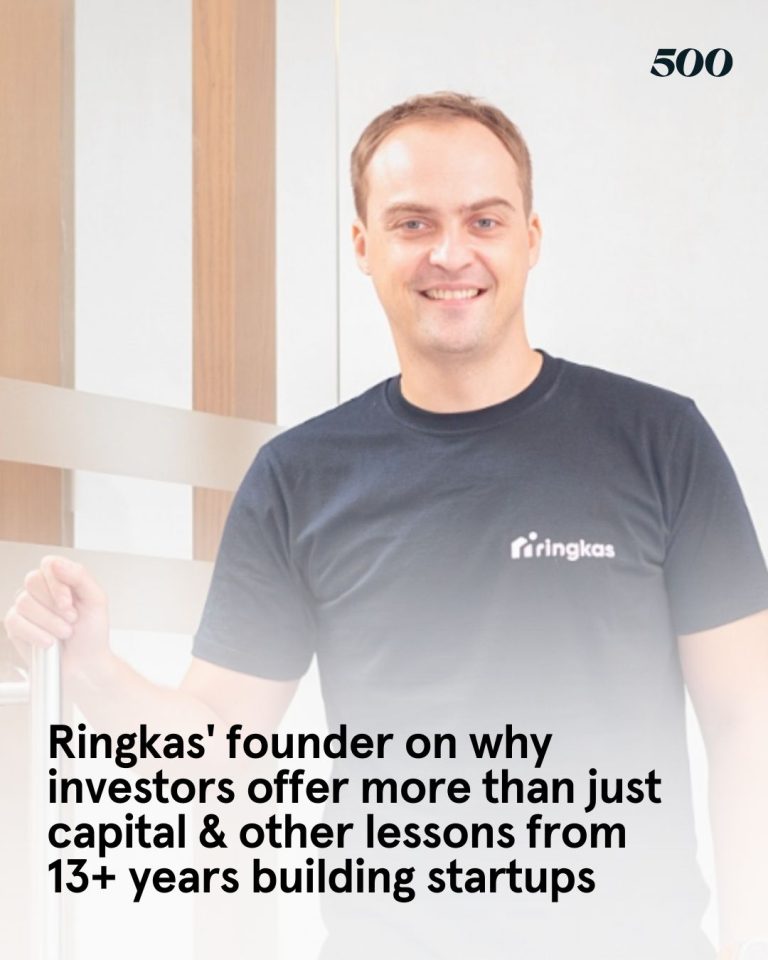Delivering Christmas cheer
- 500-backed online grocery delivery startup, HappyFresh, partnered with social enterprise Dreamr to bring Christmas gifts to 100 children with autism of all ages around Kuala Lumpur.
- The gifts were carefully curated based on the children’s ages and their special needs.

- The National Autism Society of Malaysia (NASOM) helped reach out to parents to register those interested in participating in the program. NASOM indicated there has been a spike in the number of those seeking its services in recent years, but due to its dependence on public donations, it has struggled to keep up with the demand.
- Hu Hun Hui, Managing Director of HappyFresh Malaysia was one of the crew of delivery personnel dressed in festive outfits. “We are very excited and humbled to be working with Dreamr on another initiative. It serves as an opportunity for us to continue to give back to the communities affected by this pandemic, and what better way by spreading the joy in the form of presents,” he said.
- In July 2020, Dreamr and HappyFresh partnered to provide healthy breakfasts to over 150 students.
- Since the pandemic hit, HappyFresh noticed a fall in spending power and lowered their delivery fee. The startup also made delivery free for certain basket sizes and removed its minimum spend threshold at various supermarkets and stores to make online grocery shopping affordable.
- HappyFresh has been actively giving back to the community. In May, HappyFresh launched #RunInUnity, a fundraising campaign across Malaysia, Indonesia and Thailand. Group Chief Executive Officer (CEO), Guillem Segara, ran a half marathon to help communities that were most affected by Covid-19, raising US$14,424. The funds were divided equally across the 3 operating countries and donated to selected organisations.
Planning with a purpose
- Founder of 500-backed healthtech startup Naluri, Azran Osman-Rani, offered an alternative view on goal-setting for the new year in a video.

- Stating he isn’t a “fan of the annual budgeting and planning process”, he shared 90% of new year’s resolutions are not achieved. The reason? They tend to focus on outcome goals, such as revenue or profit growth, increase in market share, or launching new products.
- According to Azran, the challenge with outcome goals is that they are set based on what has already been achieved in the current year, creating what he called ‘incremental thinking’: “maybe next year we’ll do 5% or 10% more”.
- He posits that real breakthroughs don’t come from an incremental approach, but rather, from a zero-based approach.
- “If you could start with a blank sheet of paper without any legacy constraints would you really continue to do the same thing next year as you did this year? Are you truly guided by your core purpose, what really matters to you? Or are you going to continue doing the same thing because that’s comfortable?” he asked, adding that such goals can create a tunnel vision, leading to an overemphasis on an outcome that is 12 months away.
- So, what kind of goals should one set? He shared his method of setting ‘behaviour goals’: daily and weekly actions and regular reflections of our external environment, internal compass, and what we need to keep changing and tweaking.
- For Azran, he focuses on quiet mornings, learning something new each week through books, and learning and growing from spending time with people who inspire and energise him every week.
- “Organizations and cultures that focus on weekly practices of reflecting, recalibrating, and learning will be able to move much faster and be truly agile and thrive in today’s era of speed,” he concluded.
Pivoting in property sales
- Property buyers are now less inclined to leave their homes to visit property showrooms, and find it more challenging to complete their paperwork during the pandemic, shared Joshua Ong, co-founder and chief strategy officer of 500-backed proptech platform MHub in an interview.
- According to Joshua, prior to the pandemic, the startup was on a growth trajectory and had plans to increase its property-developer client base and expand its suite of ten apps, which cuts down the typically 9-month property transaction process into one.

- What did the startup do next? Review its plans for 2020, discuss meaningful ways that could help clients prepare for the unprecedented situation, and launch the “Showroom for Buyer” app, a self-service solution for homebuyers.
- “With Covid-19, buyers are now reluctant to visit sales galleries and secure their units. Thus, we have developed a solution where developers can grant the same access directly to property buyers so that they can log in, make their unit selection and complete the whole reservation process while being guided by the property developers remotely,” he said.
- Joshua added that as a cloud-based solution, MHub has enabled remote working within the real estate industry. As such, the startup’s clients can conduct business as usual in terms of lead prospecting and property sales.
- What about physical events, such as the balloting and unit selection process? To tackle that, MHub became the first in Malaysia to introduce Facebook live events for property developers. The first digital balloting event was held in June this year by IJM Land.
- The startup’s agility paid off, enabling it to capture about 25% of the country’s property bookings this year. Between January and September 2020, it signed on 45% more property developers.It also more than doubled the number of banks and real estate agents using its platform. Within the same period, the number of registered users surged to 10,000.
- Despite its success in the digital space, Joshua concluded, “As a tech company, however, we need to understand that digital solutions cannot cater for 100% of the market. We also need to cater for the minority who are not tech-savvy…I think it is important to create this space for them because it will be premature to assume that 100% digital solutions are the right way to go, and there [would] be no way for users to get help from staff.”
- Read the full interview here.
Missed out the last Daily Markup? Go here to check it out.
You can also find us on LinkedIn, Facebook, Twitter, and Instagram.

500 Startups is a venture capital firm on a mission to discover and back the world’s most talented entrepreneurs, help them create successful companies at scale, and build thriving global ecosystems. In Southeast Asia, 500 Startups invests through the pioneering 500 Southeast Asia family of funds. The 500 Southeast Asia funds have backed over 240 companies across multiple sectors from internet to consumer to deep technology. It continues to connect founders with capital, expertise and powerful regional and global networks to help them succeed.
This post is intended solely for general informational or educational purposes only. 500 Startups Management Company, L.L.C. and its affiliates (collectively “500 Startups”) makes no representation as to the accuracy or information in this post and while reasonable steps have been taken to ensure that the information herein is accurate and up-to-date, no liability can be accepted for any error or omissions. All third party links in this post have not been independently verified by 500 Startups and the inclusion of such links should not be interpreted as an endorsement or confirmation of the content within. Information about portfolio companies’ markets, competitors, performance, and fundraising has been provided by those companies’ founders and has not been independently verified. Under no circumstances should any content in this post be construed as investment, legal, tax or accounting advice by 500 Startups, or an offer to provide any investment advisory service with regard to securities by 500 Startups. No content or information in this post should be construed as an offer to sell or solicitation of interest to purchase any securities advised by 500 Startups. Prospective investors considering an investment into any 500 Startups fund should not consider or construe this content as fund marketing material. The views expressed herein are as at the date of this post and are subject to change without notice. One or more 500 Startups fund may have a financial interest in one or more of the companies discussed.




